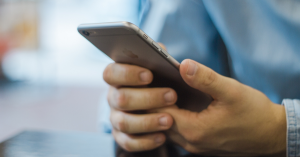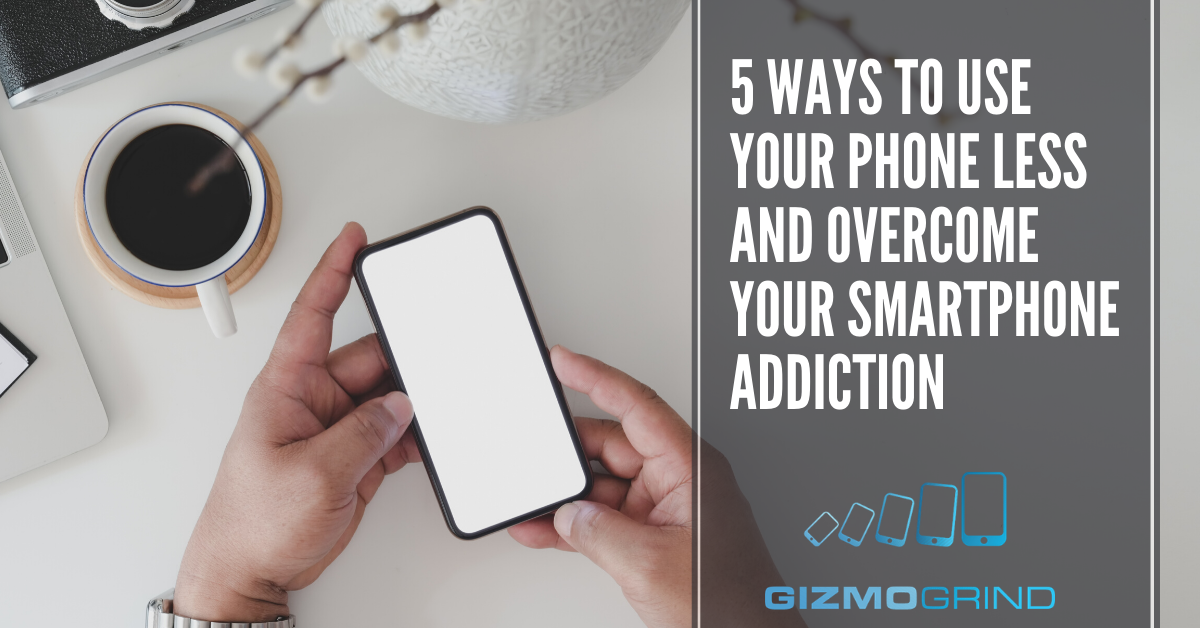Let’s face it, we all love our smartphones.
You probably spend more time with your device than you do with most other people in your life. The question is, could that obsession be a sign of a serious problem? and you want to less and overcome your smartphone addiction?
Deloitte found that the average person checks their phone about 47 times a day – and that number is a lot higher the younger that you are. Users spend an average of four hours a day staring at their smartphone screens too.
While that might not seem like a big deal at first, the truth is that the more time you spend glued to your gadgets, the less time you spend building important relationships, and looking after your health.
You don’t necessarily need to sell your phone and live a life free from technology if you want to make a change to your routine. However, you do need to find a reliable way to cut back on your addiction.
This is your guide to changing your relationship with your phone.

Table of Contents
Why Can’t We Just Put the Gadgets Down?
Before we look at some of the steps you can take to overcome your obsession, let’s explore why smartphone addiction is such a common problem today.
Researchers are still exploring the connection we have with our phones. A lot of people believe that it’s the phone itself that’s addictive. After all, our devices are incredibly useful and convenient. They’re packed full of information and allow us to access a host of useful apps and tools.
While many of the biggest tech giants have begun to do their part to reduce our screen time in recent years, no-one has made much of a difference yet. Even Apple’s decision to cut down on third-party apps doesn’t mean that we spend less time on our phones.
One former Google manager believes that the issue comes down to immediate gratification. The smartphone is a “slot machine” that delivers dopamine in the form of alerts and entertainment. Every time we check our phone, we get some kind of reward – that’s why we keep doing it.
What’s the Problem with Less and Overcome your Smartphone Addiction
So, why can’t we just keep using our phone as often as we like?
After all, if these devices make us happy – surely that’s a good thing?
Unfortunately, the effects of phone addiction can correlate with a number of negative psychological symptoms. Anxiety and phone usage have a close connection in many studies. People who spend more time on their phones are more likely to have low self-esteem, be depressed, or be anxious.

Phone addiction can also lead to other issues, such as:
- Inability to sleep: The blue light on your smartphone keeps you awake and connected to your device, so you can’t get the rest that you need.
- Information overload: Compulsive web surfing fills your brain with information and makes it difficult to concentrate on other things.
- Nomophobia: The fear of being without your device, to the point where you panic instantly if your phone is taken away from you.
- FOMO: The fear of missing out
- Textiety: Anxiety caused by the feeling that you need to respond to every message on your phone straight away.
The more time we spend on our phone, the more chances we have of being isolated and unable to connect with other human beings too. Your attention completely taken up by your phone when you’re using it. What’s more, studies have found that people who spend more time on social media are more likely to be narcissistic.
5 Tips for Reducing Smartphone Usage
So, how can you keep your smartphone addiction to a minimum?
One option is to sell your phone and opt for a device that has fewer addictive apps and tools. However, most of us won’t feel comfortable doing that.
If you’re not ready to give up on your smartphone yet, try these options instead.
1. Track Your Smartphone Usage
It’s often much easier to make a difference to your relationship with apps and tools when you understand that connection first. Downloading a tool like Checky or Moment will help you to measure how many times you actually check your device each day.
The chances are that you’ll be pretty surprised by how big the number is at first. However, whatever your number is, once you know it, you can work on lowering it.
Once you’ve tracked yourself, you can start to set restrictions that help to minimize how much time you spend on your device.
One useful tip to get you started on cutting back. Disable the “raise to wake” feature that instantly turns your screen on as soon as you nudge the device. That little feature immediately convinces you to pay more attention to your phone. Go into your settings, display, and brightness, then toggle “raise to wake” into the off position.

2. Audit your Apps
According to a study by Weforum from 2018, people often spend the most time on social media apps like Instagram and WhatsApp. However, we’re also heavily addicted to things like YouTube too. Whatever apps keep you stuck to your phone, try getting rid of them.
Deleting the apps completely so that you need to log into your computer to use the service is the best way to reduce screen time. However, if you can’t take that step, you can at least remove the apps from your home screen, so you don’t see them every time you unlock your phone.
Remember to turn off the push notifications that keep alerting you and asking you to check your phone too. You can do this by going into the “Notifications” part of your settings tool. You should really only use notifications for the things you need to know about instantly.
3. Spend Some Time Apart
Human beings have gotten into the habit of taking their smartphones with them wherever they go. The problem is so significant at this point that we’re actually taking our devices to bed with us, as well as into the bathroom. Taking your phone into the bathroom is unhygienic, and it increases your risk of spreading bacteria and germs.
On the other hand, taking your phone to bed with you increases your chances of being unable to sleep properly at night. Harvard Health found that the artificial light from phones and other devices is harmful to our sleep quality.
Not only are you keeping yourself awake with bright lights, but you’re also increasing the risk that you’ll spend more time awake checking social media too. Carve some time out in your schedule where you can disconnect from your phone for a while.
4. Switch to Grayscale
This might sound like a simplistic idea but bear with us.
Remember how we told you that smartphone addiction is supported by the fact that we always get a reward when we check our phone? Switching your phone to grayscale is a way to reduce that reward. Many people in this Vice report had decreased feelings of addiction once they switch the visuals on their phone to gray, rather than using color.
It’s not nearly as exciting to keep checking your phone when all you get is a bunch of grey images in return. By switching your phone to grayscale, you increase the chances that you’ll start only checking your device when you really need to.
Go into your Settings and visit the “Accessibility” page on your phone. From there, you can visit “Display and Text Size” and scroll down to the color filters option to choose grayscale.

5. Cut Back Slowly
Finally, remember that overcoming smartphone addiction is about changing the habits that have been ingrained into your brain. It’s not always the easiest thing to do.
If you’re having a hard time making a massive change to your tech usage, then the best thing you can do is start small. According to Dr. Larry D. Rosen, it may be helpful to start giving yourself small tech breaks. In other words, once you’ve checked your phone once, don’t allow yourself to look at it again for another 15 minutes.
Although it might be hard to force yourself to avoid checking your phone straight away if a notification comes through, the more you can commit to your breaks, the better. Eventually, you’ll be able to increase your breaks by another five minutes and continue doing this over a period of weeks or months.
It helps to let your family and friends know what you’re doing too, so they understand if you don’t respond to texts or messages instantly.
Overcoming Your Smartphone Obsession
Overcoming smartphone addiction isn’t easy. It’s going to feel as though you’ve put yourself on a diet from your device, and that’s likely to leave you feeling deprived. However, remember that you’re taking these steps for an important reason. You’re making progress towards a healthier lifestyle, where you can stop being so deeply reliant on your device.
The more you can cut down on your smartphone usage and start reconnecting with the world around you, the happier you’ll be.
